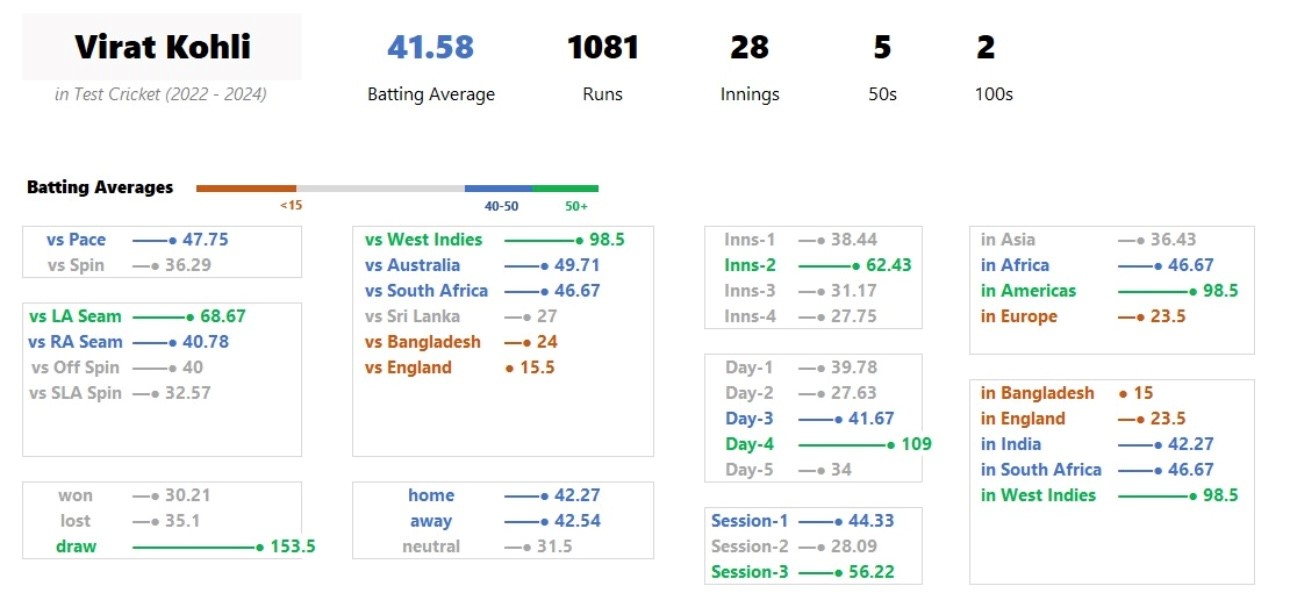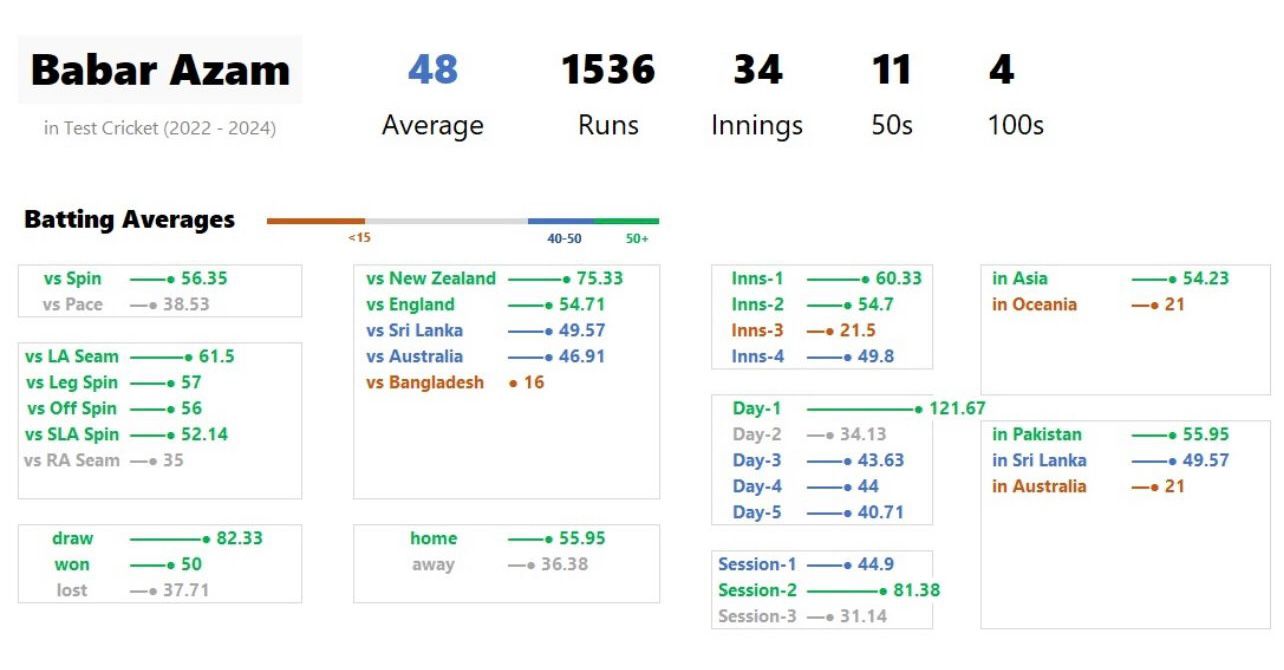Babar Azam: An enigma lost to his shadow
JournalismPakistan.com | Published last year | Dr. Nauman Niaz (TI)
Join our WhatsApp channel
Babar Azam's sacking from the Pakistan Test team is an event steeped in paradox and tragedy. It is poignant and hurts deeply. His has been a story that defies the simplistic narrative of pedestrian lackluster form or plummeting averages. This decision, rather than driven by a series of inadequate scores, seems rooted in something far deeper, a convergence of jealousies, politics, and the alienation that often accompanies celebrity status. For in Babar, Pakistan cricket discovered a trendsetter, a symbol of refined brilliance whose progress conjured both admiration and envy in equal measure.
The Ironic Role of Azhar Ali
It is an irony both bitter and insightful, equally reflective that Babar, once instrumental in the retirement of Azhar Ali, now finds himself pillaged by a selection committee with Azhar Ali the part. The urge, the perception, how cyclical life is, fickle and changeable, finds quintessence here as if reminding us of the arbitrary make-up of power and influence. Only in 2021, Babar was exalted, spotted as a generational talent, one of the most attractive batsmen in the world and presumably referred to as one of the finest ever in the history of Pakistan cricket. Averaging an awe-inspiring 62.00 with eight centuries between 2019 and 2021, he was reckoned archetypically nonpareil of his generation, a player of rare composure and elegance, a real inheritor to Pakistan's prolific cricketing legacy.
The Isolation of Greatness
Yet, as is often the case with those who clamber swiftly to greatness, Babar created a cocoon around him, of self-protection, seething arrogance, and someone oblivious of how isolated he was. The weight of acclaim had him caged, his triumphs forging a plinth from which even the slightest stumble seemed overstated, overblown, and unrealistically amplified. The crowd's chant, once a symphony of admiration, began to echo with a note of expectation, then of demand, as if his every appearance at the crease must somehow reaffirm his status, his right to be hailed as Pakistan's generational talent.
Babar's Decline: More than a Victim of Circumstance
To see Babar as a victim of circumstance alone, however, would be to overlook the inevitable strains that accompany any top sportsman to the summit. His decline, one suspects, is not the mark of a player losing his way but rather of a soul besieged by the forces he once ruled. His current travails are less a fall from poise than a reckoning, a reminder that even the finest of talents can slither, assailed by the acclaim that brought them into being.
The Path to Rediscovery
Perhaps, in this period of exile, Babar will find a renewed sense of purpose, a chance to rediscover the essence of his batting that once defined him. For greatness, if it is to be sustained, must not simply withstand the test of time but must also survive the inevitable trials of human frailty. It is not for us to bewail or lament Babar’s decline, nor to anticipate his return, but rather to reflect upon the transient aspects of brilliance and the overpowering seclusion, that peculiar aloneness that often is an adjunct to those who possess it.
The Artistry of Babar's Batting
Babar Azam flaunted the art of batting, his cover drives left the connoisseurs flummoxed and he was the only one from the Pakistan team who defied mediocrity and who burgeoned on the world stage, international commentators, entranced yet envious, marveled at the ease with which he sculpted beauty from the simplest of strokes, each shot a brushstroke on cricket's landscape, contemplated to become part of the folklore. His presence at the crease was more than a simple performance; it was an act of creation, a testament to the timeless allure of elegance in a world increasingly drawn to power-hitting.
Babar’s Rise and the Barriers He Faced
Babar was growing, progressive, and was completely focused on his batting, something which had come naturally to him. By 2019, his irrepressible form during the ICC World Cup saw the world mesmerized to see how swiftly, elegantly, and with a resolve he mastered his batting. A product, someone who was making ripples throughout cricket's landscape and from Pakistan, where the game's governance had been overridden by nepotism, inherent insecurities, the vested, corruption, intolerance, and mediocrity wasn't ready to accept the inroads he had made into what could make him power-centric and indispensable. And he was not naive, he could feel how hard it could be to traverse through layers of unacceptability that were fast growing around him.
Sudden Ascension to Captaincy
Having never once led a team, not in his schooldays, nor at club level and lacking experience of an apprenticeship in the art of leadership, Babar Azam found himself thrust into the captaincy of his nation's cricket team, an appointment as much political as it was imperative. He possessed neither the shrewdness of a tactical mind nor the deftness for managing men, for his talents lay elsewhere, in the realm of refined batsmanship, where he harvested accolades and admiration aplenty. Yet, it was his burgeoning reputation with the bat that saw him installed as captain across all formats, replacing Sarfraz Ahmed, whose record in T20 internationals was unrivaled. This decision abided the imprimatur of none other than the then Prime Minister of the Islamic Republic of Pakistan, Imran Khan, who, in his iconoclastic view, had handpicked Babar for the role. But the appointment was premature, and in Babar's hands, the mantle of leadership rested uneasily, for the qualities that make a masterful batsman are seldom those that fashion an inspiring captain, even a better leader.
The Uneasy Balance of Power Between Babar and the PCB
As Babar Azam's stature multiplied within Pakistan cricket, the powers within the Pakistan Cricket Board (PCB) grew increasingly wary. Here was a captain, who, irrespective of results, seemed to call the shots, a power that began to eat into the traditional authority of the Board. To the PCB, measures had to be devised to curtail this newly realized strength, for it unsettled the very scope of their control. Paradoxically, while Pakistan's team, under Babar's captaincy, lacked silverware, they had nonetheless reached the semi-finals of the ICC World T20 in 2021 and the finals in 2022. Alongside him, Shaheen Shah Afridi and Mohammad Rizwan consistently accrued the ICC performance awards, fashioning a rallying point for the team. This was a Pakistan team remarkably resistant to corruption, a far cry from the tainted legacies of the past.
Surrogate Advertising and Moral Integrity
Yet, such moral integrity drew the ire of various stakeholders, including members deeply rooted in the PCB bureaucracy, franchises, and influential broadcasters, each watching vested and commercial interests. Surrogate advertising, now a staple of mainstream sponsorship, presented a moral dilemma. Mohammad Rizwan, resolute in his principles, repeatedly refused to slip on the logo of a surrogate company for his franchise, a decision that stirred both resentment and admiration. Similarly, Babar, freshly aware of his rights through a sports management company, began questioning the Board's commercial motives and compelled the authorities to revise the central contracts accordingly, in addition to declining a lucrative deal worth PKR 250 million annually from a surrogate advertiser. This dissonance strewed skepticism within the PCB bureaucracy, for Babar's resistance now became an impediment to their money-making machinations.
A Bold Challenge to the Establishment
What most unsettled those in the corridors of power was when Babar Azam and Mohammad Rizwan dared to challenge cricket's establishment by seeking an audience with one of Rawalpindi's most influential personalities. In an audacious move, they succeeded in banning surrogate advertising entirely, prompting official notices from the Federal Ministry of Information & Broadcasting and the Security Exchange Commission of Pakistan, in strict alignment with the nation's Constitution and the Betting and Gambling Acts of 1978. This decree rattled the commercial foundations of cricket's sponsorship landscape, leaving influential interests reeling from the following financial losses.
Navigating Treacherous Waters: Babar and Rizwan Under Pressure
Now, both Babar and Rizwan found themselves navigating treacherous waters, with influence working feverishly to erode their positions. To sustain themselves, they had to deliver, and yet, the stakes were far beyond the stadia. Rizwan, in his steadiness, managed to remain afloat, though his chances of ascending to captaincy, a role he deserved by his integrity and skill seemed dimmed, for he was not a member of the cricketing establishment's inner sanctum. Meanwhile, Babar's form, fragile and wavering, left him perilously exposed. He stood at the edge of a precipice, where the merit of his art could scarcely defend him from the hands mobilizing to pull him down.
PCB's Growing Discontent with Babar Azam
The disharmony sprouted and was conspicuous. For the PCB, Babar was no longer an asset but a daunting force misaligned with their interests. Though he remained Pakistan's premier batsman, deep-seated in the runs and difficult to overthrow, the PCB discovered subtle methods to marginalize him. Thus, Babar and Rizwan were 'rested' under the pretext of rotation, and Shadab Khan was made captain for a series of T20 Internationals against Afghanistan in Sharjah. At that moment, mistrust began to permeate the dressing room, the once cohesive spirit now fissured with resentment.
The Impact of Distrust on Babar's Leadership
Consumed by this climate of insecurity, Babar's judgment wavered. He began selecting players not solely on merit but on allegiance, protecting his inner circle even when it compromised the team's strength. Pakistan's performances faltered, the crevices widening as Babar's focus turned inwards, towards the peripheral power struggles rather than the batting he once adorned. Thus, the distraction, the inevitable, ruinous distraction took root, and the destructive descent ensued.
The Statistical Injustice: Babar vs. Shafiq and Masood
Let us now delve into the numbers, for they provide a narrative of their own. The exclusion of Babar Azam from the Pakistan Test line-up appears starkly incongruous when juxtaposed against the retention of Abdullah Shafiq, whose averages, though respectable, betray a waning consistency: an average of 50.00 in 2021, followed by 51.43 in 2022, then 39.66 in 2023, and a mere 15.50 in 2024. And yet, he remains permanent. In 9 out of the 10 innings where Abdullah Shafiq has opened with Saim Ayub, the two had failed to produce a partnership of 10 or more. Shan Masood, whose position in the team has often teetered on the edge of debate, not only retained his place but ascended to the role of captain. His performance, bereft of substantial achievements save a lone 150 plus on the embarrassing flatness of a Multan wicket, underscores the irony. Here stood a man ready to endorse the dropping of Babar, and yet his claim was tenuous at best.
A Deeper Look at Shifting Allegiances
What lies beneath these shifting allegiances? In turning to the evidence, we find an unsparing reality that compels us to weigh the exclusion of Babar Azam against the continued presence of players such as Abdullah Shafiq and Shan Masood, Pakistan's Test captain. Babar's recent run, a drought of half-centuries in 18 innings, with a highest score of 41 seems precarious for a player of his calibre.
The Kohli Parallel: A Comparison of Situations, Not Status
And yet, Virat Kohli, anointed as India's, if not the world's, premier batsman, has sustained a similar phase. From 2022 to 2024, Kohli averaged 41.58 in Tests, amassing 1,081 runs over 28 innings, including five fifties and two centuries. Here we aren't comparing Virat Kohli with Babar Azam since there is no comparison at all. Virat has been there, at the heights, and achieved what may well be a distant thought for Babar in contemporary times. There exists no comparison. We are just making the situations and statuses in their teams comparable.

Kohli's Statistics: A Complex Portrait
A granular examination of Kohli's statistics reveals a nuanced portrait: he averaged 47.75 against the fast bowlers, 36.29 against spin, excelling particularly against left-arm quicks with an average of 68.67. His proficiency has fluctuated, with a robust 98.50 against a middling West Indies attack, and a modest 15.50 against England. Even in neutral contexts, be it in the home or away Tests, under the harsh scrutiny of overseas crowds or in the comfort of home turf, Kohli's averages remain a study in variance, ranging from 42.27 at home to 42.54 away, slipping to 31.5 on neutral grounds.
In innings played in the five-day Test, Kohli has mastered flow, with an average of 38.44 on the opening day, swelling to an impressive 109 on the fourth. His regional records further reflect this adaptability: an average of 36.43 in Asia, soaring to 98.50 in the Americas, yet a mere 23.50 in Europe. Such intricate statistics testify to the complexities of form and fortune, of context and condition.
Babar Azam's Ouster: Numbers Alone Don't Justify It
Thus, the decision to part ways with Babar Azam, while retaining others, asks for a rationale anchored in something more than numbers alone. What justification lies in cleaving too much familiar Shafiq and Masood, even as the captaincy changes hands and allegiances wane? Here, we confront the evidence, for it is within these numbers that the true question resides, one not of only averages, but of where our reliance and conviction in the art of batting truly exists.
Formidable Record: An Unassailable Truth
Babar Azam, from 2022 to 2024, boasts a formidable record with a Test average of 50.03, amassing 1,501 runs across 32 innings, including 11 half-centuries and four centuries. This is the unadorned, brutal truth, a reality that defies the manufactured perception of his supposed failure. Indeed, his recent dearth of half-centuries across 18 innings may lend itself to critique, but does it warrant his exclusion? Decidedly not. His status as Pakistan's finest contemporary batsman remains incontrovertible, his class and pedigree unassailable.
The Art of Batting: Babar's Superior Skillset
While Saud Shakeel and Salman Ali Agha may flaunt their runs, Babar's skill and pedigree stand in a class apart. Against fast bowling, he has averaged a solid 42.92, while his fluency against spin elevates to 55.47. His perceived vulnerability against left-arm spin is challenged by a 51.29 average, and his mastery over leg spin is underscored by an imposing 57.00. His contributions resonate with victory, averaging 50.00 when Pakistan triumphs, and 82.33 in the drawn matches, while still resilient at 39.84 in losses.
A Batsman of Adaptability: Babar's Home and Away Record
The nuances of his record reveal a batsman of great adaptability. At home, his average impregnates to a laudable 60.47, contrasting with 36.38 on foreign soil. His averages across Test innings reflect both his strength and adaptability: 66.40 in the first innings, a steady 54.70 in the second, 24.80 in the third, and a reassertion at 49.80 in the fourth. The cadence of Test match days reveals his tendency to thrive on day one, boasting a staggering 167.50, and sustains an admirable 51.80 on day four, tapering slightly on day five at 40.71.

Babar Azam's Versatility Across Regions
In Asia, his average strikes an alluring 57.29; in Pakistan, 60.47, while in Australia, he endures a modest 21.00. Herein lies a testament to his skill, a cricketer of rich versatility and unmitigated caliber, whose strength lies not only in numbers but in the substance that underpins them. To disregard such merit is to misunderstand the very essence of his artistry as a generational batsman.
The Need for Closure in Pakistan Cricket
Reflect, if you will, upon a recent subpar performance. What was its cause? Perhaps, inadequate rest, distractions, an overzealous training regimen, or a sudden acquiescence to pressures from outside that invariably accompanies such endeavors. Likely, we need to seek and seize upon an explanation, a narrative to account for why Babar has faltered. It may not have been immediately apparent, but with a measure of reflection, a justification no doubt crystallized.
This propensity to craft stories is singular to Pakistan cricket, a trait that distinguishes us from our developed boards. It is not merely an impulse for amusement, but a fundamental need. We seek to resolve loose ends, to stitch together the fragments of our experiences into a seamless drapery, one we can understand and from which we may walk away reassured. Lacking closure, our minds veer towards uncertainty, a state so disquieting that we are compelled to construct some semblance of a conclusion, however tenuous. It is this inherent desire for closure that drives us to attribute causes to our actions, to label them as triumphs or failures. But often, the tales we spin, while insightful, are not entirely accurate.
The Recency Effect: A Bias in Cricket Narratives
Herein lies a truth: the narratives we build, while occasionally grounding, are as prone to artifice as they are to accuracy. Thus, a need for perspective for the wisdom to see beyond the present, beyond the story we tell ourselves, and towards the full scope of our journeys. What Babar has gone through is what the social scientists have a term for this phenomenon, the recency effect. It's a proclivity in our minds to affix causation to the immediate events before us. We desperately desire explanations that are neat, direct, and linear: If this, then that. This is precisely why we cling to sudden revelations, whether they be sightings of astrological omens or other such fanciful beliefs. They provide the kind of simple and immediate answers our minds crave, giving us a sense of closure, albeit a fleeting and superficial one.
The Bias of Recent Events
Babar presumably, despite being enormously experienced, however, failed to mute this bias. Knowing that while recent events seem to carry the most weight, the truth often lies elsewhere, dispersed across a broader span of preparation and perseverance. Indeed, to understand success or failure truly, one must resist the urge to seize the nearest explanation and instead cultivate the patience to search for deeper causes. Which he didn't while it was happening to him, he will now since it has already happened to him. The world around him has subsided.
The Illusion of Triumphant Performances
Babar has to realize, that he was only trained to celebrate triumphant performances, and attributing it all to hard work, and wisdom dictates a broader view, acknowledging that it was the meticulous, incremental building of a batsman over time that forged the foundation for that success, he had. Yet even if he musters the strength to resist the siren call of recent events, how he may well be assigning blame remains significant.
Blame and Its Heavy Stigma
The term 'blame' carries a heavy stigma, laden with negativity. It conjures images of fault-finding, where one's character or self-worth is brought into question. In truth, when we assign blame, we're attempting to rationalize an outcome, to pinpoint a cause. How we navigate this act reveals much about our resilience. What he needs to do is to avoid self-blame, thus exempting himself from the obligation to learn and evolve.
The Choice Between Comfort and Growth
The choice, then, is stark: To remain in the shallow comfort of easy answers, or to embrace the discomfort of self-reflection, transforming blame into a tool for growth rather than a shield against it. For only through honest introspection he may well fortify against the arduousness of the future challenges.
A Modern Tragedy: Babar's Rise and Fall
The story of Babar Azam's decline is both a modern tragedy and a cautionary tale, interwoven with themes of personal ambition, public expectation, and the relentless pressure of the cricketing world. For a brief period, Babar seemed destined to inherit the throne of Pakistan's cricketing greats, a rare gem who appeared capable of shouldering the heavy mantle left by his predecessors. His rise was as dazzling as it was meteoric, yet his fall reminds us of the fragility of brilliance and the often harsh reality faced by those thrust into the spotlight.
From the outset, Babar was hailed as Pakistan's prodigy, a player of rare class and elegance in a country that has traditionally prized raw power and aggression. His technique was a study in balance, his timing a gentle reminder of the artistry in cricket, a game which, in its finest moments, becomes an expression of both individual talent and collective passion. For the connoisseurs in Pakistan, starved of a true cricketing hero since the days of Inzamam-ul-Haq and Saeed Anwar, Babar was not just a player; he was their hope. But with that hope came an almost crushing weight of expectation.
The Crushing Weight of Expectations in Pakistan
In a nation where cricket is a near-religious passion, the role of a star player is fraught with the hopes and dreams of millions. Every run scored becomes a matter of national pride, and every failure, a collective disappointment. As Babar took on not only the role of Pakistan's premier batsman but also that of captain, he found himself increasingly vulnerable to the intertwined pressures of performance and captaincy. In a way, he became a tragic figure, burdened by the very love and adulation that had once lifted him to greatness.
The Loneliness of Stardom
There is a curious loneliness that comes with being a star in the world of sports. For Babar, the solitude of stardom was perhaps most profoundly felt on the cricket field, where he often appeared as a solitary figure in a batting lineup that relied heavily on his contributions. It is one of the paradoxes of fame: the more one succeeds, the more isolated one can become. As Babar's reputation grew, so did the expectation that he would deliver, match after match, run after run.
The Isolation of Individual Performance in Cricket
This sense of isolation can be particularly pronounced in cricket, a sport that juxtaposes individual performance within the team framework. As his form began to waver, one could sense a player increasingly distanced from his strengths, struggling to reconcile his natural game with the demands placed upon him by the team, the media, and the fans. In those moments of solitude, as he stood at the crease or in the field, one wonders if Babar felt the weight of the world upon his shoulders, an Atlas condemned to carry an impossible burden.
The Crisis of Identity in Declining Form
For any artist and there is no denying that cricket, at its finest, is an art, the loss of form is not merely a slump in performance; it is a crisis of identity. Babar Azam's batting was once a study in elegance and precision, each shot flowing effortlessly from his bat as if he were conducting a symphony. But as his form declined, what was once natural began to seem forced, and the fluidity conceded to hesitancy. The very shots that once defined him now seemed to betray him, and with each failure, the sense of self-doubt grew.
The Tragedy of a Decline
This is perhaps the most profound tragedy of a decline: it erodes the very essence of a player. Babar's story reminds us that greatness in sports is as much a matter of mental resilience as it is of physical skill. When a player's identity becomes inextricably linked with their form, the loss of that form becomes an existential crisis. Babar, who once seemed to symbolize the spirit of cricket, now faced the troubling reality of having lost touch with the very qualities that had made him great.
The Burden of Captaincy
When Babar Azam took on the role of captain, it was seen as a natural progression, an acceptance of his stature and influence within the team. Yet, the role of captain in Pakistani cricket is uniquely challenging, a cauldron of conflicting interests, intense media scrutiny, and a cricket board often criticized for its lack of stability. As captain, Babar found himself in a dual role that often placed him at odds with himself, tasked with the strategic leadership of the team while simultaneously striving to maintain his form and focus as a batsman.
The Strain of Leadership on Performance
Leadership is not just a matter of tactics and decision-making; it is also a reflective test of character. For Babar, the strain of leadership seemed to chip away at his aura, forcing him to confront challenges that went beyond the cricket field. Under the pressure of captaincy, and the extra-terrestrial intrigues, and ploys, his batting, once unshakable, became susceptible to the very distractions he was tasked with navigating for his team. The decline in his performance mirrored the turmoil within, as the weight of leadership exacted a toll on both his body and spirit.
Babar’s Struggles Reflect the State of Pakistani Cricket
In Babar's decline, we see not just the unraveling of a player but also the broader existential crisis of a nation. Cricket in Pakistan has always been more than a sport; it is a canvas upon which the hopes, frustrations, and dreams of a people are painted. Babar's struggles on the field are, in many ways, emblematic of the challenges facing Pakistani cricket as a whole system plagued by inconsistency, political interference, and a lack of vision.
Babar is a Symbol of Resilience
Yet, even as he falters, Babar remains a symbol of resilience. His career thus far has been a testament to the potential of Pakistani cricket, a reminder of the heights that can be reached when talent and opportunity align. In his decline, we are reminded of the cyclical nature of greatness, the inevitability of rise and fall, and the relentless march of time. The question now is whether Babar can override the struggles that currently define him, whether he can once again find that delicate balance between his identity as a player and his responsibilities as a main cog in the Pakistan team, away from the perils of being a captain.
The Deeper Questions of Sport and Greatness
The decline of Babar Azam invites us to ponder the deeper questions that lie at the heart of sport: What does it mean to be great? How does one navigate the tension between personal ambition and collective expectation? And perhaps most importantly, how does a player reconcile the transient nature of form with the enduring spirit of the game?
The Legacy of Babar Azam
In the end, the story of Babar Azam is a reflection of the human condition, a tale of aspiration, achievement, and, ultimately, vulnerability. He is a reminder that even those who seem larger than life are subject to the same fears, doubts, and struggles as the rest of us. His decline, far from diminishing his legacy, adds a layer of depth to his narrative, a reminder that greatness is not only about triumph but also about the bravado with which one faces adversity.
As stakeholders and followers of cricket, perhaps the most we can hope for is not that Babar will return to his former self, but that he will emerge from this phase with a renewed sense of purpose, having gained a deeper understanding of himself and his place in the world of cricket. For in the end, it is not the centuries scored or the records broken that define a player's legacy, but the journey, the highs and lows, the struggles and triumphs, and the moments of quiet reflection that give meaning to the pursuit of excellence.

























